올해 컴업을 흔든 10명의 혁신 창업자들
Byline Network
2024. 12. 13.
“두 번 떨어지고 세번째 도전에 끝까지 왔다. 역시 재도전이 짱이다” 조규석 투니모션 대표
“최근에 나라에 어려움이 있었다. 스타트업을 하는데 매출이 0원이다. 그래도 걱정 없이 회사를 알릴 수 있는 것은 정말 좋은 우리나라여서 가능하다” 안태진 포어텔마이헬스 대표
“모든 스타트업 대표님들과 직원들, 모두 건강하시라” 김형진 포스코어 대표
이 감동적인 말들은 올해 컴업스타즈에서 최고로 꼽힌 세 팀의 수상소감이다. 컴업스타즈는 국내 최대 규모 스타트업 축제 ‘컴업 2024’의 핵심 프로그램이다. “시장성, 혁신성, 성장성, 글로벌 성장 잠재성을 가진 스타트업을 찾아라” 라는 기치 아래 혁신 스타트업을 선정한다. 올해 1208개 스타트업이 지원했고, 그중 40팀이 예선을 통과했으며, 10팀이 결선 피칭 무대에 올랐고, 최종 3팀 ▲투니모션 ▲포스코어 ▲포어마이헬스 ‘더 베스트 컴업 스타’가 됐다.
베스트 컴업 스타를 포함, 결선에 오른 총 10팀은 어떤 기술을 갖고 있길래 1208개 회사 중에서 열 손가락 안에 꼽혔을까. 이들의 아이디어와 기술, 비즈니스 모델을 12일 컴업 현장에서 이호찬 ACVC파트너스 대표와 류중희 퓨처플레이 공동대표, 김광록 프라이머사제 공동대표가 심사했다. 10팀의 발표는 어땠을까? 3명의 심사역은 무엇을 궁금해 했을까? 현장을 공유한다.
최종 선발 10팀: 모바휠, 제틱에이아이, 카본에너지, 큐빅, 투니모션, 튜블릿코리아, 포어텔마이헬스, NSS워터, 테크이글, 포스코어

투니모션
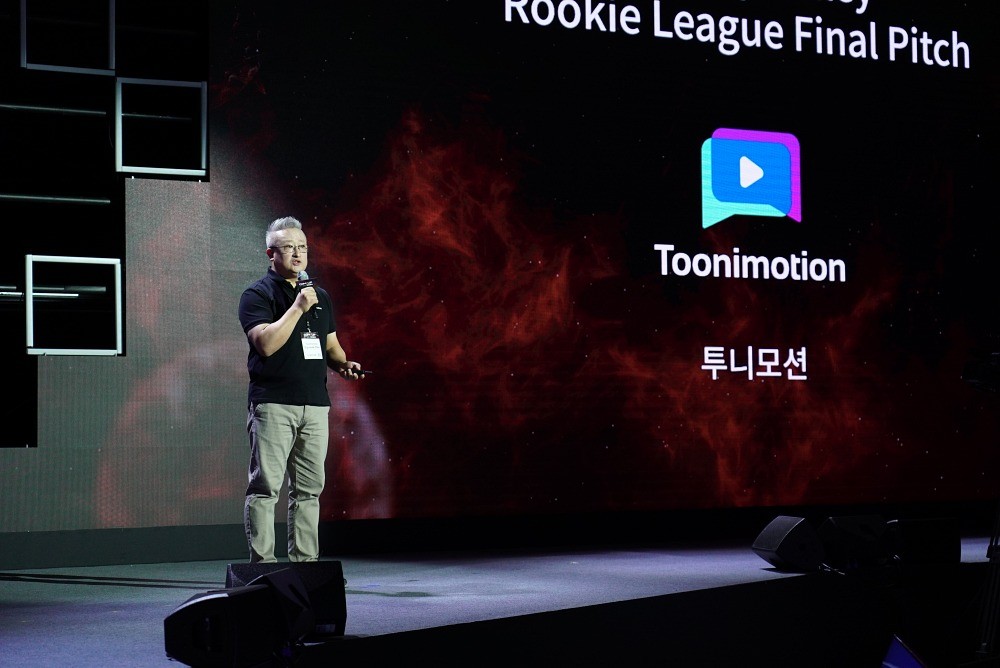
조규석 투니모션 대표
“수많은 웹툰 중 영상화 된 웹툰은 1.9%에 불과하다”
뒤집어 말하면 나머지 98.1%의 웹툰도 언젠가 영상화가 될 가능성이 있단 뜻이다. 그러나, 웹툰의 영상화에는 시간과 돈이 많이 든다. 웹툰 원화를 그대로 쓰는 방식이라면? 새로 그림을 그릴 필요가 없으니 비용이 확실히 줄어든다. 웹툰의 영상화, 세계화를 촉진시킬 아이디어를 서비스화 한 ‘투니모션’은 올해 컴업스타즈의 최고 혁신상을 받은 세 기업 중 하나가 됐다.
투니모션은 아직 영상화 하지 않은 웹툰을 발굴, 애니메이션으로 제작해 OTT에 공급하는 콘텐츠업사이클링 기업이다. 애니메이션에 대한 수요는 웹툰 작가, 독자(시청자), OTT 플랫폼 모두에 있으나, 제작에 드는 비싼 비용과 오랜 시간 때문에 국내에선 활발히 만들어지지 못했다. 투니모션은 이 시장의 페인 포인트인 ‘비용과 시간’을 획기적으로 줄일 방법을 들고 창업했다. 웹툰의 그림을 그대로 사용하는 과정에서 화질이 깨지는 문제는 AI를 통해 해결했다. 기존 공정의 80%가 줄어드는 방식으로, 투니모션 측에 따르면 기존 애니메이션 대비 8배 빠르게 제작이 가능하다.
조규식 투니모션 대표는 “한 편당 4분을 넘지 않는 숏폼 시리즈의 애니메이션을 50~70화 분량으로 아주 빠르게 제작해서 OTT에 공급하는 시스템을 갖고 있다”면서 “지난 2년 간 총. 개의 작품을 애니메이션으로 만들어 국내 플랫폼에 론칭했다”고 말했다. 또, “최근에는 기술을 더욱 업그레이드해서 일본 망가를 컬러화 해 영상화하는데 성공했다”면서 “일본 망가 시장이 매우 크기 때문에 내년에는 일본 시장으로 진출할 예정”이라고 덧붙였다.
류중희 퓨처플레이 대표의 “한국보다 인건비가 적은 나라에서 더 가격 경쟁력 있는 서비스가 나오면 어떡하겠느냐”는 질문에 조규석 대표는 “단순 반복작업의 경우엔 가격 경쟁력에 밀릴 수도 있고, 심지어 외주를 주는 것이 더 나을 수 있다”면서 “하지만 투니모션이 가진 핵심 기술은 영상을 정확히 연출하고 움직이는데 있고, 이런 기술은 아직 동남아시아에서 적은 가격에 이만한 퀄리티를 내는 곳이 없다”고 강조했다.
포스코어
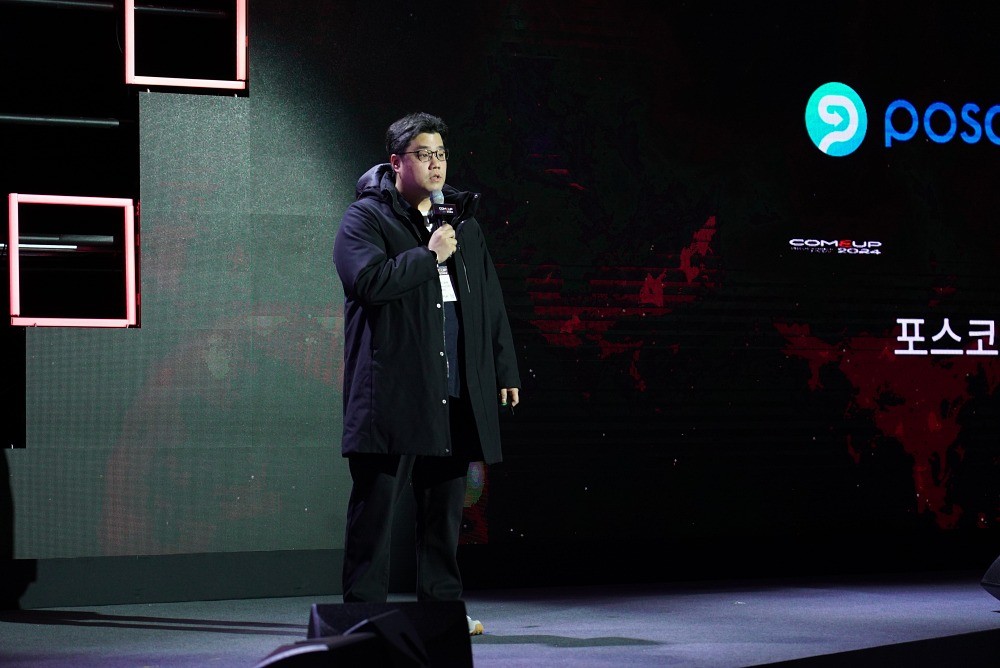
김형진 포스코어 대표
포스코어가 하는 일은 저 부가가치의 철강부산물을 활용해 고기능성 자성분말과 분말코어를 만드는 것이다. 전기차 수요가 늘어나면, 모터를 만드는 재료의 공급이 따라가지 못해 생기는 시장을 겨냥했다. 미래 모빌리티는 전기차 중심으로 재편될텐데, 전기차에 필수인 ‘핵심 모터’의 ‘핵심 재료’를 값싸게 만들 수 있단 자신이 있다.
경쟁사도 많을텐데? 회사의 강점이 단점이 된다면 어떻게 해야 하나. 심사역 중 한 명인 류중희 퓨처플레이 대표는 “철강 부산물을 사용한다는 강점이 오히려 성능의 단점이 될 우려는 없느냐”고 물었다. 김형진 대표는 “기존의 분말 경쟁사들이 가지고 있는 자성 특성에서 20% 정도 효율이 좋다는 걸 검증했다”면서 “실제로 (포스코어의 기술이) 경쟁력을 가지려면 다양한 애플리케이션에서 증명이 되야 할 부분이고, 지금 그것을 증명해가는 과정”이라고 방어했다. 아울러 “친환경 소재로서의 강점을 갖고 있다”는 부분을 강조하기도 했다.
포어텔마이헬스
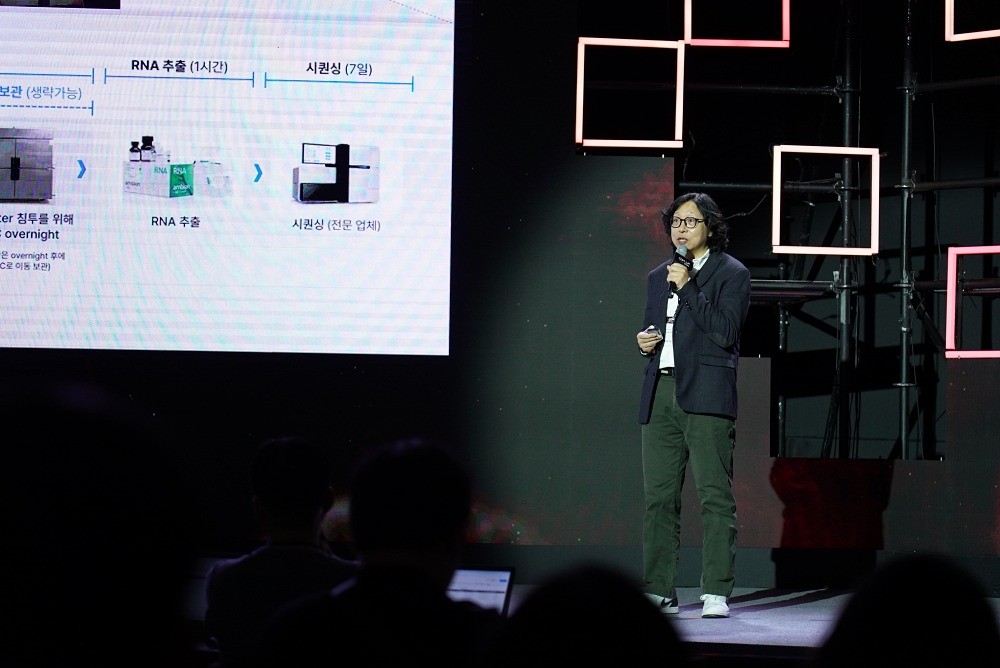
안태진 포어텔마이헬스 대표
“암은 걸리기는 싫지만, 만약 걸린다면 가장 빨리 알고 싶은 질환”
맞는 말이다. 암의 조기진단은 매우 중요하지만, 극초기에는 암 세포의 크기가 너무 작아 엑스레이나 CT로 변별해내기 어렵다. 포어텔마이헬스는 혈소판을 이용해서 암 정복에 나선다. 안태진 포어텔마이헬스 대표에 따르면 “암의 진단 시점에 혈소판의 개수가 크게 증가하고, 암으로 인해 사망에 이르는 사람들의 혈소판 개수도 증가하는 것을 볼 수 있다”고 말한다. 약 1000만명의 데이터를 분석한 결과다. 혈소판은 1분마다 몸 전체를 한 바뀌씩 돈다. 열흘이면 약 1만5000번을 심장을 지나 몸 전체를 크게 순환한다. 안 대표는 “하나의 혈소판이 암 근처의 혈관을 10%의 확률로 지나가게 된다는 것이고, 이 말은 우리 몸의 10%의 혈소판은 암을 목격했다는 뜻”이라고 말한다.
그래서 포어텔마이헬스는 암의 조기발견에 혈소판을 활용한다. 혈소판 내 유전자 정보를 분석해서 사용자에게 난소암 위험도 보고서를 제공하는 소프트웨어 매그놀리아 피씨알(Magnolia PCR)을 만들었다. 현재 국립암센터와 서울대학교 병원에서 임상 연구에 들어간 상황이다. 우선 타깃한 암은 난소암. 이후에 여성 암 전반으로 서비스를 확대할 생각이다.
이야기를 듣다보면, 이 기술이 특정 암에만 적용될 기술일지 여부가 궁금해진다. 이호찬 ACVC파트너스 대표가 그 지점을 짚었다. 그는 “혈소판 RNA 기반의 검사가 특정 암종의 바이오마커에만 적합한 것인지”를 물었고 안태진 대표는 “암종마다 특이적으로 다른 RNA 바이오마커가 있어서 다름 암종도 (검사가) 잘 된다는 것을 알 수 있었다”면서 “혈관 생성(혈관신생)이 잘 되는 암일수록 혈소판 진단에 유리하고, 혈관 생성이잘 안 되는 암일수록 혈소판 진단에 불리하다는 보고들도 알려져 있다”고 첨언했다.
모바휠
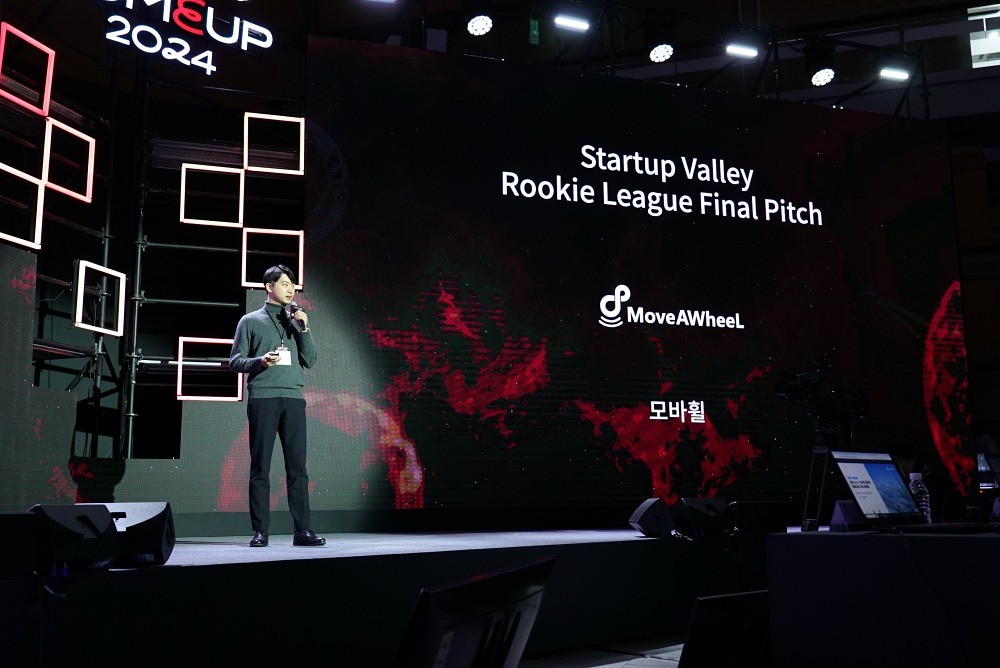
김민현 모바휠 대표
“지금까지의 내비게이션은 상습 결빙 구간에 대한 안내는 해줬지만 실시간 결빙 구간에 대해서는 알려주지 않았다”
노면 상태를 정확히 알면 더 안전한 운전을 할 수 있다. 음파 AIoT 센서를 활용한 종합도로 정보 플랫폼 이지웨이(EG-Way)를 만든다. 음파와 AI 기술로 블랙아이스나 젖은 도로 등 20가지 이상의 도로 상태를 실시간으로 감지해 전달하는 것이 핵심이다. 회사가 풀고 싶은 문제 중 첫번째는 ‘도로에 의한 미끌림 사고’다. 이런 문제는 왜 일어나나. 카메라나 레이더, 라이다 센서들은 모두 전자기파 기반의 센서이므로 투명한 노면을 감지 못한다. 실시간으로 결빙 구간을 알려주기 어렵다. 또, 노면 감지 센서가 없기 때문에 내비게이션의 실시간 결빙 구역 안내도 어렵다. 김민현 모바휠 대표는 “이지웨이 센서는 블랙아이스를 포함해 스무가지 이상의 노면 상태를 95%의 정확도로 분류할 수 있다”고 말한다.
어떻게 가능한가? 음파의 반사를 활용한다. 노면의 재질이나 상태별로 음향학적 특성이 달라지기 때문에 그에 따라 스무가지 노면 상태를 분류할 수 있다는 이야기다. 이 외에 주행량이 많은 택시나 버스 등에 이지웨이 센서를 달아서 도로 정보를 실시간 수집하는 것도 이 회사가 데이터를 모으는 방식이다. 김광록 프라이머사제 공동대표는 매출의 브레이크다운(항목별 매출)을 물었고, 김민현 대표는 “대부분의 매출은 도로에 이지웨이 센서를 설치하는 것에서 발생하고 있고, 데이터 매출도 약간씩 발생하고 있다”고 답했다.
제틱에이아이
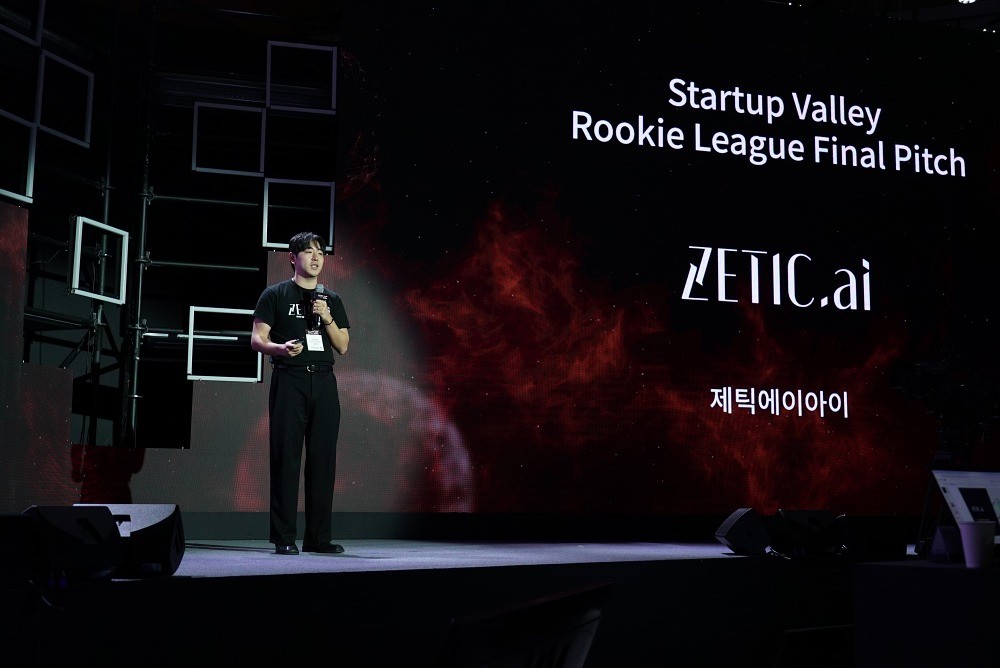
김연석 제틱에이아이 대표
“범용으로 사용될, 세계에서 가장 빠른 온디바이스 AI 소프트웨어로 AI 시장을 혁신하겠다”
생성AI가 활발해질수록 GPU 클라우드 서버 비용도 눈덩이처럼 불어난다. 이 비용을 상쇄할 온디바이스AI에 기업들의 관심이 모이는 이유다. 그러나 온디바이스AI 구현이 말처럼 쉬운 것은 아니다. 강력한 타깃 디바이스가 필요하며, 작은 디바이스에서도 AI서비스가 제대로 돌아갈 수있도록 하는 AI 모델 최적화가 필수다. 또, 최적화된 모델을 타깃 디바이스에서 돌릴 수 있는 런타임 소프트웨어가 존재해야 한다.
제틱에이아이는 스마트폰이라는 강력한 타깃 디바이스에 들어가 AI 서비스를 최적화해 구현할 온디바이스 AI 통합 솔루션 제틱멜란지(ZETIC.MLange)를 만든다. AI 모델을 다양한 디바이스의 인공지능칩(NPU)에 최적화해서, 데이터를 온디바이스에서 실시간 처리하게 해주는 솔루션이다. 사용자가 보유한 AI 모델을 활용해 쉽고, 빠르고, 간편하게 온디바이스 AI 애플리케이션을 만들 수 있게 하는데 초점을 뒀다. 김연석 대표는 “안드로이드와 iOS, 리눅스 등 거의 대부분의 모바일 플랫폼에 AI 모델 배포를 지원한다”는 것을 자사 솔루션의 강점 중 하나로 꼽았다.
성장속도도 빠르다. 컴업 참여 전에는 아직 소프트웨어를 시장에 검증하지 않은 기업이었으나, 컴업스타즈 멘토링 기간에 네트워킹을 통해 고객사를 확보했다. 김 대표는 “해당 기업이 제틱에이아이와의 협업을 통해 소프트웨어 속도를 기존의 3배 이상 끌어올렸다”고 말했다. 다만, 이 회사가 꼽는 강점 ‘범용성’이 오히려 회사의 성장을 발목잡는 것 아니냐는 류중희 대표의 질문에 “특정 회사의 필요에 의해 기술을 제공하는 것은 단순 외주와 다름 없는 한계가 있기 때문에, 소프트웨어 회사는 소프트웨어 회사와 일하면서 범용적으로 배포하는 것이 필요하다”는 취지로 답했다.
카본에너지
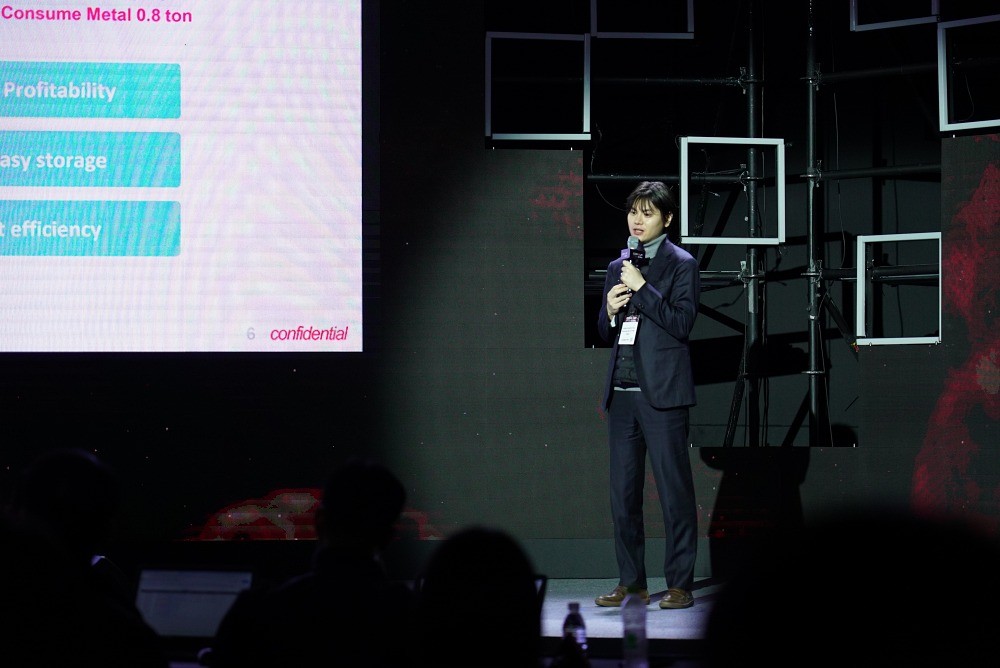
나시영 카본에너지 대표
“공기 중에 있는 CO2를 화학 반응을 통해서 포집해 환경 문제를 해결한다”
기업이 모든 이산화탄소 배출을 완벽히 통제할 수 있나? 어렵다. 그렇다면 공기 중의 이산화탄소를 직접 포집하는 것이 훨씬 효과적 방법 아니겠나. 이런 아이디어를 가진 회사는 이미 여럿 나왔다. 카본에너지가 다른 것은 포집 방식이다.
공기 중의 이산화탄소를 직접 포집하겠다는 기술 회사는 이미 여럿 나왔다. 카본에너지는 전기를 써서 이산화탄소를 포집하는 것이 아니라 금속과 이산화탄소를 화학반응 시키는 방법으로 탄소를 포집한다. 이렇게 되면 화학반응의 결과물로 가성 소다를 얻을 수 있다. 화학 반응 중 손실되는 열 에너지를 전기 에너지로 변환해 회수할 수 있는 기술을 갖고 있는 것은 덤이다. 에너지를 잃지 않으면서, 이산화탄소를 포집하고, 그 과정에서 가성소다라는 부산물을 얻는다는 일석삼조의 기술을 카본에너지가 들고 나왔다.
그런데 그렇게 얻은 가성소다는 어디다 쓰나? 궁금했는데 이호찬 ACVC파트너스 대표가 물어줬다. 나시영 대표는 “청소할 때도, 식품 첨가물에도, 유리를 만들 때도 쓰인다”면서 “건축 자재의 일부에서도 가성소다가 많이 사용되므로 건설사가 탄소 중립 솔루션과 수익을 동시에 확보할 수 있는 구조”라고 답했다.
큐빅
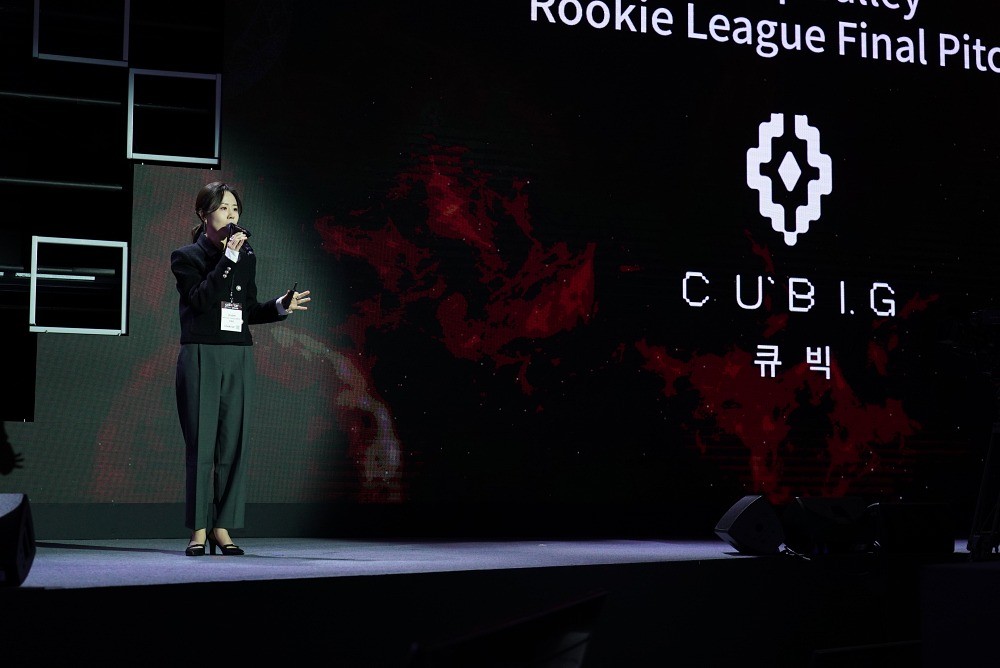
정민찬 큐빅 대표
“데이터의 새로운 패러다임이 열렸다. 새로운 데이터 시장을 리드하겠다”
인공지능 활성화를 위한 전제조건으로는, 정확한 데이터 확보가 있다. 그런데 아무 데이터나 가져다 쓰면 ‘개인정보 침해’나 ‘내부 데이터 유출’과 같은 위험이 생긴다. 민감한 정보, 개인 정보를 자동으로 필터링하고 데이터를 합성해 인공지능이 학습할 수 있는 데이터로 만들어 주는 것, 그게 큐빅이 하려는 일이다. 이 회사가 만드는 솔루션의 이름은 ‘에이주(azoo)’. 안전한 생성AI를 위한 필수 솔루션을 기대하고 있다.
정민찬 큐빅 대표는 “AI 시대에 데이터가 매우 중요하지만 예민한 정보를 포함하고 있기 때문에 강력한 법의 규제를 받는다”면서 “큐빅은 진짜 같은 가짜를 만들어 이 문제를 해결하고 있다”고 말했다. 이 가짜 데티터가 합성을 통해 인공지능이 학습할 수 있게 만들어낸 데이터를 뜻한다. 류중희 대표가 “AI를 만드는 회사에서 직접 학습 데이터를 만드는 것이 트렌드 아니냐”고 묻자 정 대표는 “내부에서 개발을 실패해 저희에게 의뢰를 주는 기업들도 있다”면서 “합성 데이터를 기반으로 데이터를 증폭시키는 것 등은 아무 기업이나 할 수 있는 쉬운 일이 아니다”라고 말했다.
튜블릿코리아
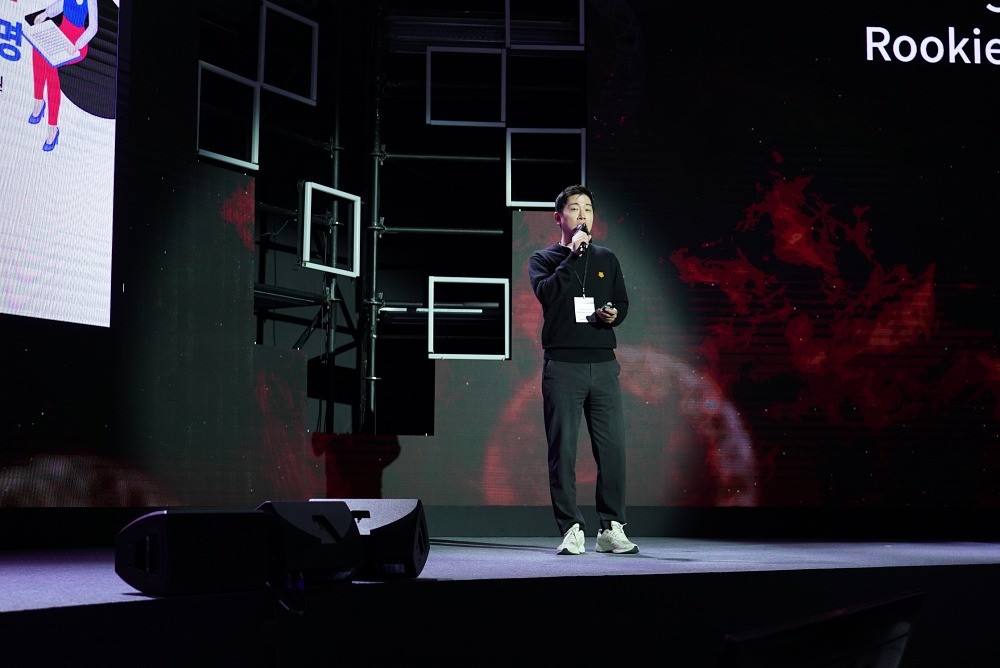
튜블릿코리아는 중고등 학생과 대학생을 연결해주는 비대면 과외 플랫폼을 제공한다. 주로 하버드나 예일, 스탠포드, 유펜 등 아이비리그를 포함한 명문대 대학생이 이 플랫폼에서 강사로 일한다. 그간의 누적된 학습 데이터를 기반해 강사와 학생을 매칭한다. 태블릿을 통해 강사와 학생이 실시간으로 화면과 필기를 공유한다. 학부모는 매 수업 시간 종료 후 학생의 학습에 대한 강사의 평가를 받아볼 수 있다.
학생과 튜터들을 연결하는 매칭을 AI 기술들로 활용하고 있다. 수업의 성과와 학생들의 만족도를 자동적으로 체크하는 것을 플랫폼으로 지원한다. 안민우 튜블릿코리아 대표는 “튜터들이 보여주는 퍼포먼스들이 튜블릿에 좋은 데이터로 남을 거라고 생각하고 있고 이 데이터들을 기반으로 언젠가는 순수하게 AI로 작동하는 그런 AI 튜터 시대를 열려고 한다”고 비전을 밝혔다.
NSS워터
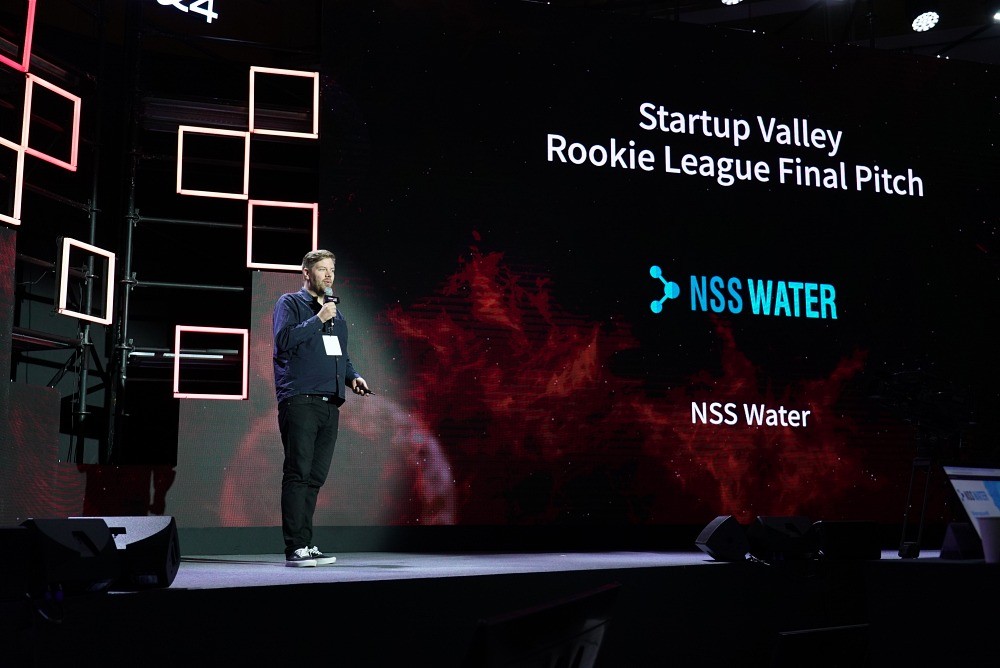
반도체를 만드는데 왜 ‘초고순도 물’이 필요하냐고 묻는다면, 의외로 쓰이는데 가 많다. 제조 공정은 물론이고 공정 가스를 정화하거나 클린룸의 온도와 습도를 조절하는 데도 쓰인다. 아주 작은 오염으로도 생산에 큰 차질을 빚을 수 있는 반도체 공장에서는 물 역시 초고순도를 찾을 수밖에 없다. 스웨덴에서 온 엔에스에스 워터(NSS Water)는 5나노미터(nm) 이상의 오염물질이 없는 초고순도 물을 생산한다. 특히, 물 사용량을 최대 90%까지 줄이는 기술로 반도체 공장의 경비 절감에도 영향을 준다고 강조한다.
비욘 홈스트롬 NSS워터 대표는 “순수한 물을 만드는 공정 및 장비는 독창적인 특허 공정 기술과 설계로 이루어져 있다”면서 “한국에서도 이미 특허를 등록했고, 다양한 고객 요구와 시장에 맞춰 다양한 구성을 제공할 수 있다”고 말했다.
테크이글
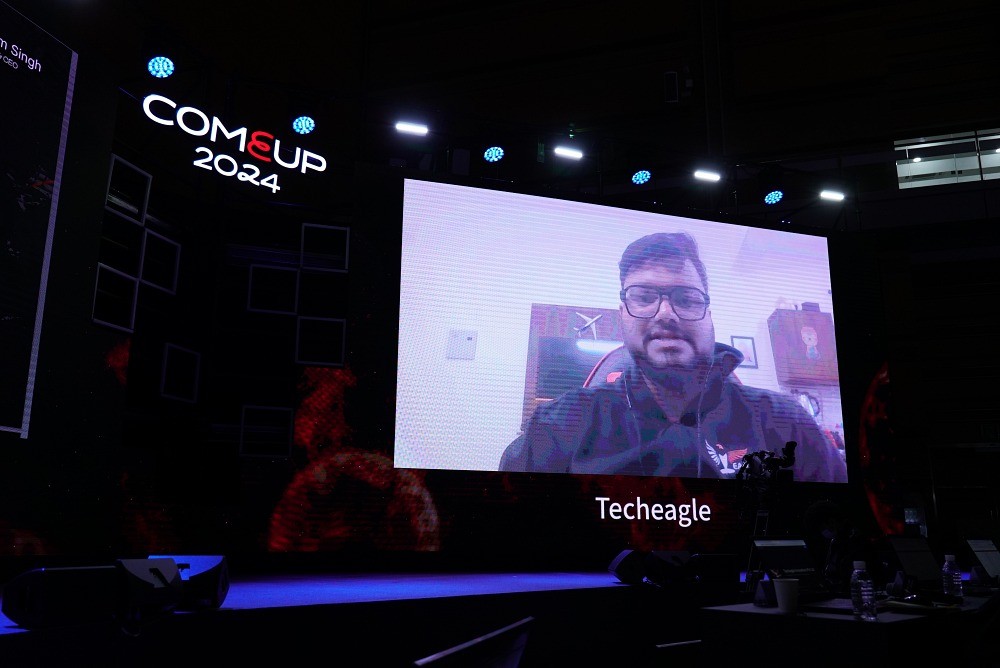
테크이글 이노베이션스(TechEagle Innovations)는 기본적으로 물류에 쓰는 드론을 만든다. 물류에서는 중앙에 허브를 두고, 여러 목적지(스포크)로 상품을 집중적으로 운송, 배분하는 방식을 ‘허브 앤 스포크’라고 부르는데 테크이글 이노베이션스는 이 방식을 육로가 아닌 공로에서 드론을 갖고 실시한다는 아이디어를 갖고 있다. 기반 기술은 AI와 5G 통신이며, 하늘길을 이용하므로 육상 운송 대비 25배 이상 빠른 속도로 최대 100km 거리까지 물품을 운송할 수 있다고 이 회사 측은 설명한다. 소형 택배나 의료용품 등을 주문형으로 드론배송할 수 있는데, 인도 여러 주에 의료품을 원격으로 드론 배송한 경험을 쌓았다.
비크람 싱 미나 테크이글 대표는 “(드론으로 인한 물류가) 지상 물류와 비교했을 때 비용이 더 적게 든다”면서 “드론을 사용함으로써 기반시설에 대한 자본 지출과 운영 비용이 크게 절감되기 때문인데, 특히 여러 기반시설을 고려해야 할 경우에는 더욱 그렇다”라고 강조했다.
글. 바이라인네트워크
<남혜현 기자> smilla@byline.network


